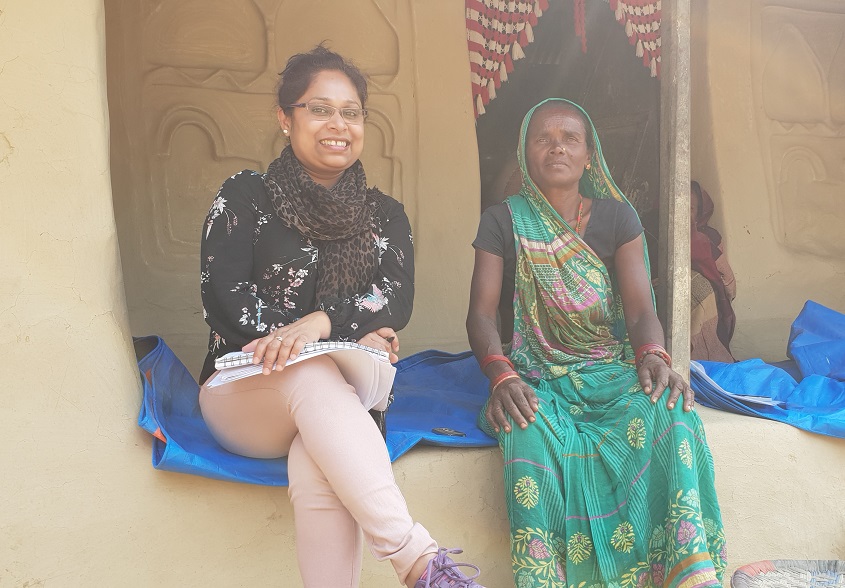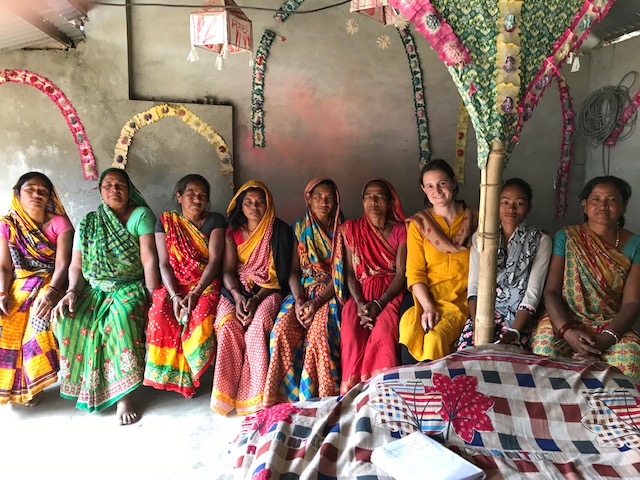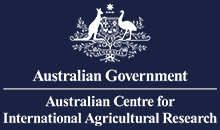The annual meeting of DSI4MTF “Dry Season Agriculture for Marginal and Tenant Farmers in the Eastern Gangetic Plains” was held in Kolkata from 1st to 5th October 2018. The venue was ICAR’s National Institute of Research on Jute and Allied Fibre Technology. Delegates were welcomed by NIRJAFT acting director Dr Alok Nath Roy.
There were 28 attendees representing all partner groups. The program ran over five days with a focus on documentation and reporting. Participants agreed the key achievements and areas where we have had greatest impact include:
- Introduction of collective farming systems resulting in improved nutrition security and economic situation.
- Cropping system diversification and enhanced productivity.
- Improved water management and irrigation practices.
- Initiating a shift from traditional to diverse crop systems
- Empowerment of marginal, tenant and woman farmers.
While the research approach has been successful in building collaboration and developing the capacity of marginal farmers, there remain important issues related to sustainability of the collectives and their ability to continue some of the cropping systems, and irrigation practices, once the project is complete. Stronger linkages with the service sector and support agencies are crucial for scaling beyond project sites.
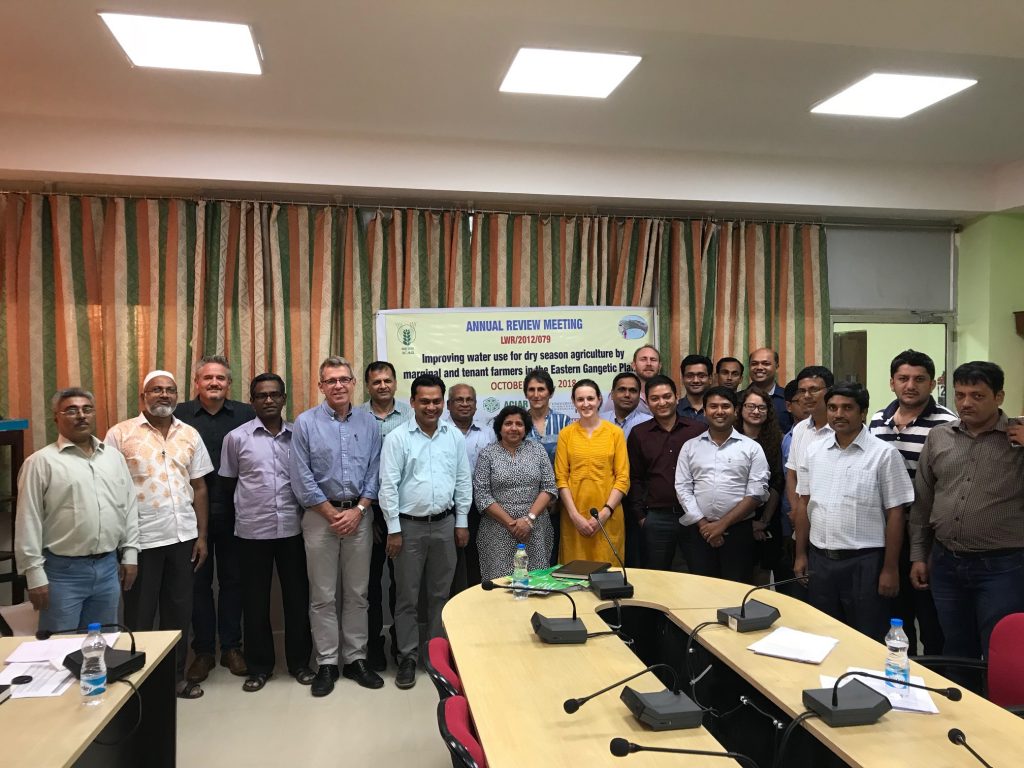
Participants at the Annual Meeting
Day 1: BioPhysical Planning Workshop
Day one of the program focused on reviewing biophysical data collection and reporting requirements. Discussions covered the value of data and the effort in collection, with a focus on adjustments that needed to be made in data collection, refining methods and confirming reporting requirements.
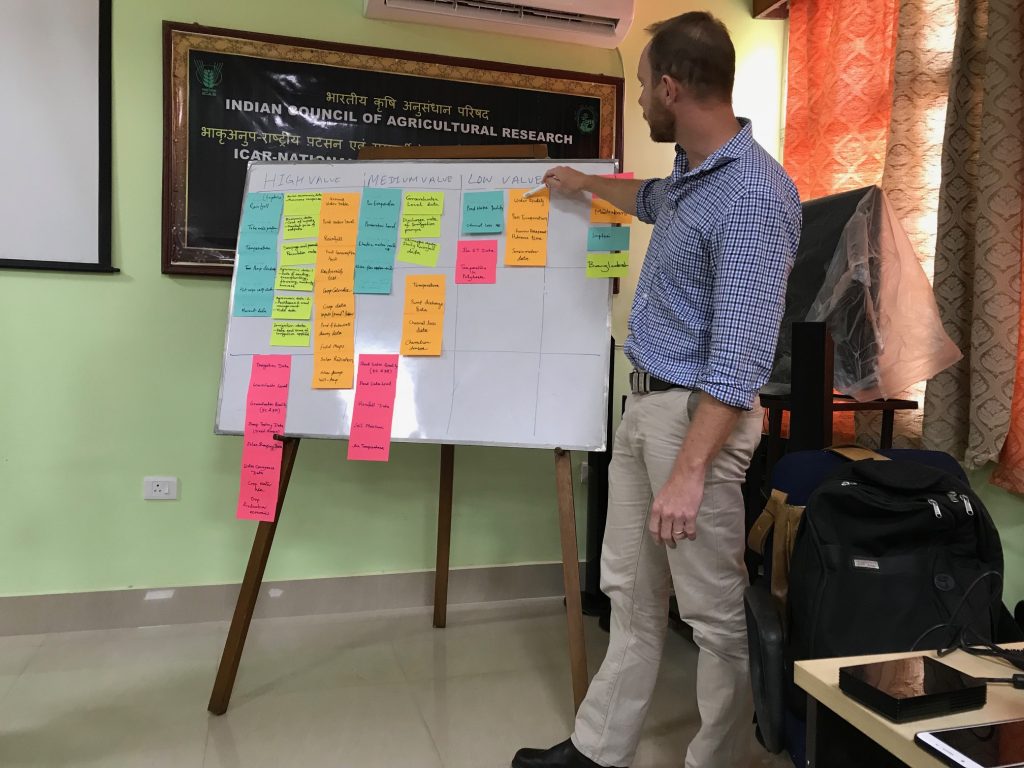
Mapping out the value of and effort in data collection.
Day 2: Introduction, Cropping Systems and Irrigation Management
Project key goals, objectives and impacts were discussed and it was noted that while the project has been challenging there has been success working across 3 countries, 10 villages, and 35 sites. There have been an increase in dry season agriculture, and farmer capacity using cooperative farming approaches.
Focus for the remaining 9 months will be on core activities of farmer and stakeholder engagement, up and out scaling, analysis of results, maintaining essential data collection, and documentation through reports, case studies and publications.
Dr. Robyn Johnson (ACIAR) provided an overview of other ACIAR and DFAT projects in the Eastern Gangetic Plains, indicating that a review of projects would occur in early 2019 to set directions for on-going ACIAR investment in the EGP beyond 2020.
Each region presented useful insights on the changes in cropping systems across our sites, from traditional to current practice, and drivers for these changes were discussed.
There has been a decrease in fallow land area and increase in crop diversity with adoption of improved crop and irrigation management practices. Some good examples of scaling beyond the project sites were shared. Ongoing training and support will be vital.
Weather, market price and pest and disease have been a key challenge at many sites. Pleasingly collectives have been innovative in adapting to these challenges.
Sessions on irrigation and water management showed how groundwater is generally not limiting whereas ponds have limited potential for irrigation. A range of practices are resulting in better water efficiency, including better water conveyance to the field through flexible pipes, introduction of improved furrow irrigation and in some cases drip and sprinkler irrigation. The importance of improved pump efficiency to reduce energy costs was demonstrated and the potential for solar pumping outlined.
Participants shared results from a large number of irrigation system performance assessments, demonstrating significant potential to save water, pumping costs and increase production.
Day 3: Socio-economic, structural, institutional and supply chain issues
The importance of ethical community engagement and changing the traditional paradigm between the researcher and researched was emphasized.
Discussions highlighted that while supportive policies are in place there is often inadequate institutional development at the local level to support marginal community access to resources. Local institutions are critical to link local farmers to extension agencies, and support and promote the adoption of best practices.
With regards, supply chains there is limited value add/processing done post-harvest by marginal farmers and limited dialogue between traders and producers. The role of collectives in marketing need to be strengthened and better linkages to government, NGO’s and supply chain participants established. Opportunities for collection centers to provide marketing, technical services support, and promote good technologies were discussed, as were the role of community business facilitators.
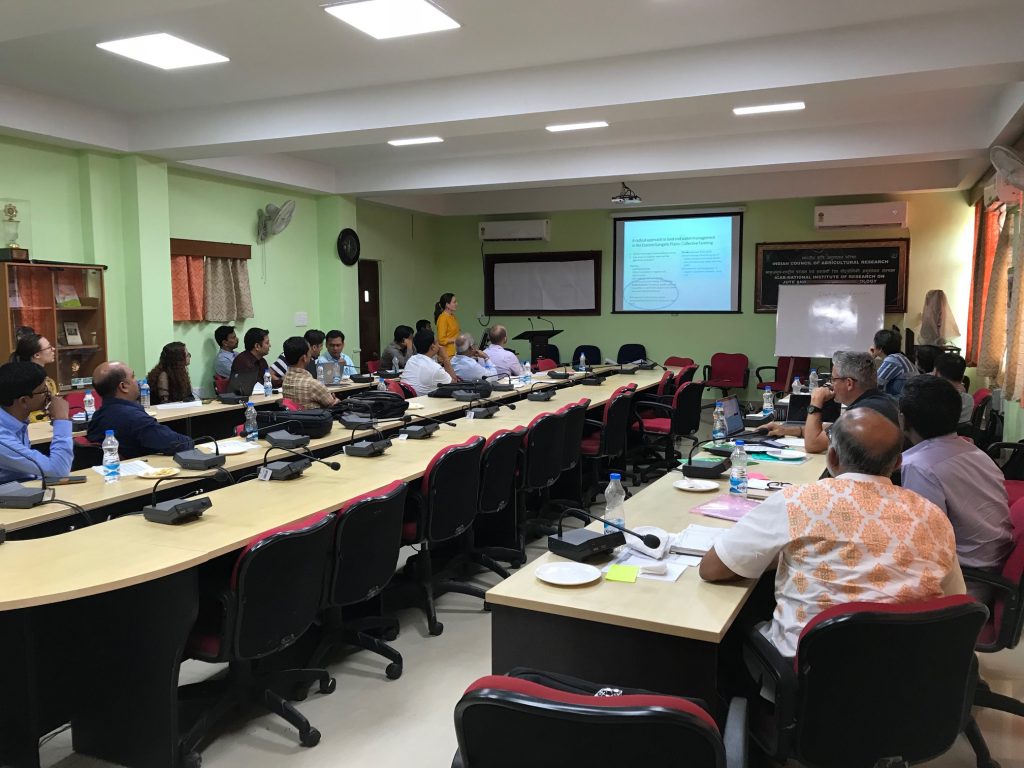
Discussion of farmer collectives, gender and political and social justice implications of redistribution of land, labour and capital for marginal farmers.
Teams also shared experiences on collective farming approaches and different models of operation. Key challenges have been time keeping and labor management, especially in intensive vegetable crops. Groups are evolving and adapting through local experience. Successes including increase in average plot size under collectives, better negotiation with the landlord and improved access to claims for government services are evident.
Experiences in out and up-scaling were shared including establishment of farmer collectives in neighbouring sites and adoption of improved irrigation practices.
Opportunities to expand our work in alignment with broader ACIAR funding programs were discussed. Bridging funds have been allocated to maintain current demonstration sites and undertake further targeted investigations.
Day 4 and 5 – Case Studies
The final two days focused on case study preparation and cross cutting themes informed by the cases. These themes include:
Themes around opportunities/positive learnings: Skill development; Convergence/network building; Change in attitudes; Confidence building/ change in aspirations; Bargaining power; Leadership development; Empathy and solidarity; Women’s inclusion; Enhanced economic security; Nutritional intake/food security; ethical community engagement, scaling of technologies
Themes around challenges: Group dynamics; Ensuring ownership; Overdependence on particular leaders; Social conflict; Market integration; Appropriate technologies.
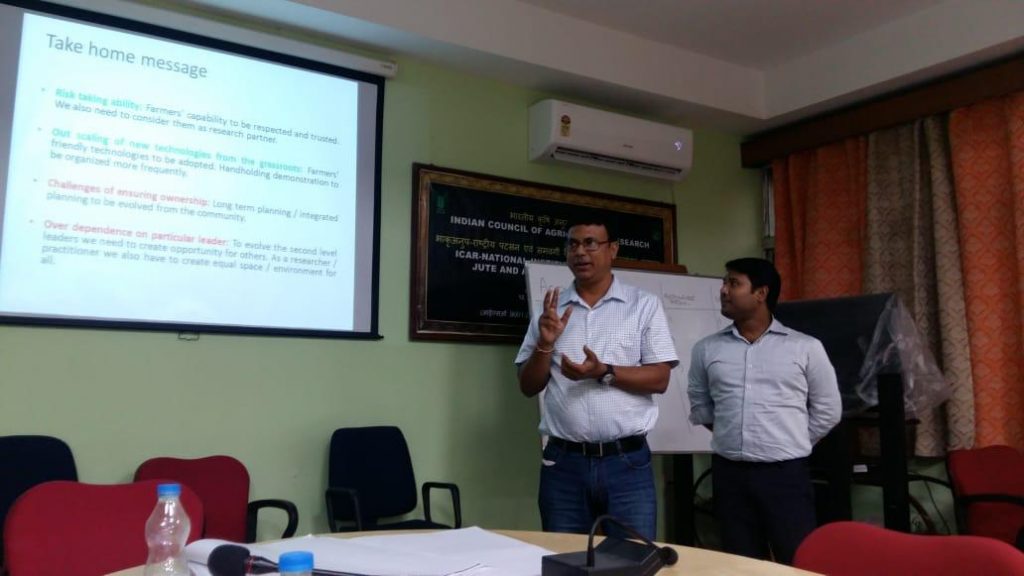
Discussion of Case Studies
Participants broke into geographic teams to progress development of existing cases around these themes.
The Annual meeting was well organized by Ajay Kumar and Anoj Kumar. Delegates valued the presentations, sharing of progress and interactive discussions.
Key focus is now on preparing documentation in readiness for our final review meeting in April 2019. Integrating results from a biophysical and social perspective and across different locations will be important.




